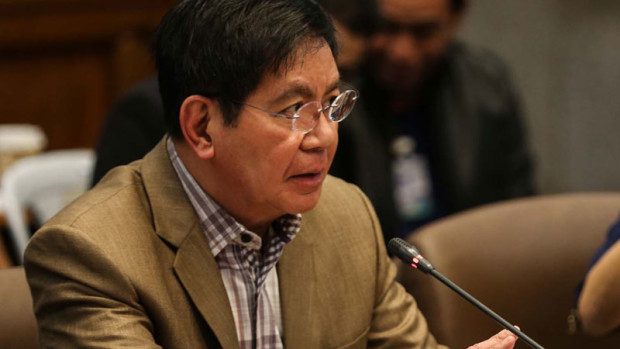Senators hit ‘double standard’ in reinstatement of Marcos
Several senators on Saturday questioned the reinstatement of a police official tagged in the suspicious killing of Albuera, Leyte Mayor Rolando Espinosa Sr., noting inconsistencies and a “double standard” in the administration’s stance on uniformed men involved in illegal drugs.
This came after President Duterte’s admission that he ordered the reinstatement of Supt. Marvin Marcos, chief of the Criminal Investigation and Detection Group (CIDG) Region 8 (Eastern Visayas).
Marcos, along with members of a CIDG Region 8 raiding team, is under investigation by the Senate committee on public order and dangerous drugs over Espinosa’s November killing while being served a search warrant while in jail.
The Senate is to resume its investigation on Monday.
Doubts
Article continues after this advertisementSeveral senators had expressed doubts over the police version of events.
Article continues after this advertisement“Kumpare, kumare, relatives, friends, etc. asking favors (from) the CPNP (Chief, Philippine National Police). It still boils down to command responsibility when something goes wrong,” said committee head Sen. Panfilo Lacson.
“Superintendent Marcos [is] now free from restrictive custody and allowed to go back to Tacloban. And I thought Ronald was strong-willed and uncompromising,” he said, referring to national police chief, Director General Ronald “Bato” dela Rosa.
Dela Rosa earlier caused a stir by saying an official higher than him and whom he considered a compadre or “buddy” had asked for Marcos’ reinstatement after he was initially relieved. This was before the Nov. 5 raid that led to Espinosa’s death.
After the incident, Marcos was again relieved of his post along with his men and placed on restrictive custody.
On Friday, Mr. Duterte said he was the official who called Dela Rosa and asked for Marcos’ reinstatement so he could be further investigated while on duty, calling him a “tainted” official. He said Marcos would now have to “face the charges” even as he stressed that Marcos has “the right to be heard.”
But Lacson, a former national police chief, said the incident contradicted President Duterte’s war on drugs, where no one, even those within the police ranks, is spared when suspected of involvement.
“I thought it was an all-out drug war I was supporting. Talk about double standard. Talk about doublespeak. Change isn’t coming after all,” Lacson said.
Questions
Sen. Leila de Lima said Mr. Duterte’s admission now puts into question his sincerity in pursuing his drug war. De Lima had earlier identified presidential aide, Christopher “Bong” Go, as the one who interceded on Marcos’ behalf, forcing Mr. Duterte to come out publicly.
“The President’s admission thus brought more questions than answers. This incident in itself should be the subject of a Senate inquiry,” said De Lima, among the President’s fiercest critics.
“After the Peter Lim episode, where a supposed drug lord kumpadre of the President is allowed to leave the country, we must start asking ourselves this question: whether or not the President, rather than De Lima, is actually the No. 1 drug lord protector and coddler in the country,” she said.
Mr. Duterte in July granted an audience to Lim, a suspected drug lord known as “alias Jaguar.” He has since left the country after the President told him to submit to an investigation.
De Lima also cast doubt on Marcos’ reinstatement, saying “there’s a deeper and, possibly, a more sinister reason for the President’s action.”
“Otherwise, why would General Bato go through this charade of pointing to a kumpadre instead of just admitting from the start that the President himself ordered the reinstatement?” she said.
Sen. Francis Pangilinan questioned why Malacañang cleared Marcos of irregularity in the operation that led to Espinosa’s death.
“If Superintendent Marcos was reinstated so that his alleged illegal activities could be closely monitored and a case built up against him, why then did Malacañang after such a reinstatement immediately clear him and support his version that Espinosa put up a fight inside prison? It doesn’t add up,” he said.
Doomed to fail
At the Lower House, Caloocan Rep. Edgar Erice also questioned Mr. Duterte’s intervention that he said could have allowed Marcos to cover his tracks.
“The reinstatement of Superintendent Marcos gives a wrong signal, he is involved in the Espinosa drug trade. His reinstatement provided him a way to cover his tracks by eliminating Mayor Espinosa. Definitely his reinstatement is wrong,” Erice said.
He noted that Mr. Duterte even backed up Marcos and his team’s version of the incident leading to Espinosa’s death.
“If President Duterte will tolerate these acts then the war on drugs is doomed to fail. The police is now acting like a monster,” he said.
But Antipolo Rep. Romeo Acop said that while Mr. Duterte could be perceived to have extended “special treatment” to Marcos, it was within his prerogative as President.
Evidence
Chief Supt. Leo Angelo Leuterio, the outgoing PNP Police inspectorate deputy director general, confirmed on Saturday that the restrictive custody against Marcos and his men has been lifted allowing them to travel even as the case continues.
He said the Internal Affairs Service had required the respondents to file their counteraffidavits and supporting evidence to defend themselves against the allegations and challenge the summary dismissal proceedings against them.
“We have to get their counteraffidavit, because based on that, we will know if we proceed with the summary hearing, or charge them. So in the interest of due process, while we are ready to charge them, they are also given a chance to explain themselves,” Leuterio said.
“They were allowed to return home, but that does not mean they are reinstated. They are relieved of their posts. Once they return, they will be again under restrictive custody,” he said. —WITH REPORTS FROM GIL C. CABACUNGAN AND CYNTHIA D. BALANA
